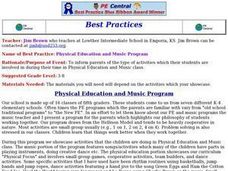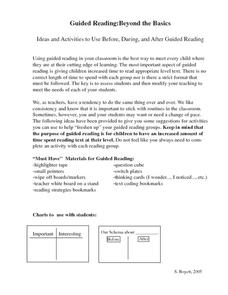Curated OER
Plagiarism
Don't get caught plagiarizing! Before starting your research unit, use this lesson to help your young writers identify plagiarism. The truth is, many kids don't even realize when they're doing it! They practice citing sources when...
Curated OER
Writing and Presenting a Fable Using Research
Elementary and middle schoolers research animal facts and use them in a fable. First, they pair-share to find animal traits to use in writing a fable. They then complete a prewriting worksheet. After going through the writing process,...
Curated OER
What Are the Issues?
Investigate and report on three issues related to a current election. Elementary aged learners research information about specific issues, develop an opinion, and write a persuasive essay using supporting details and evidence to support...
Curated OER
Pink and Say
Read Pink and Say and discuss the Civil War with your upper elementary learners. They create a KWL about the Civil War and record words relating to the Civil War as they read the book. Then they work in groups to create an ABC book based...
Curated OER
Poems: calligrams
Have fun with shape poems! First and second graders write calligrams that add to the meaning of their poems. Great for your poetry unit or if you want to combine poetry and art lessons.
Curated OER
Narrative Writing vs. Explanatory Writing
The class discusses the different purposes an author has for writing. The focus of the discussion is on writing to tell a true story and writing to give information about a specific topic. There are writing purpose sorting cards embedded...
Curated OER
Physical Education and Music Program
Teach everyone how to work together in both physical education and music activities. Parents and their children are shown a presentation that highlights the philosophy of cooperation. They apply these concepts to their physical education...
Curated OER
Exciting Expressions
Elementary schoolers observe and demonstrate a variety of strategies for reading with expression. They listen to the teacher read A Fine, Fine School with and without expression and discuss the differences. Then in pairs, read the same...
Curated OER
Just the Facts, Ma'am
Elementary learners identify the main elements of story structure and form questions to summarize their reading. They listen as the teacher reads a story and then write questions to determine (1) main characters, (2) setting, (3)...
Curated OER
Show And Tell
Have you ever saved your money to buy something you really wanted? Elementary schoolers share how they saved their money for things they wanted, and they bring in one or two items that they bought with their personal savings.
Curated OER
Dewey Decimal Game
Engage all the upper elementary classes in your school in a game to learn Dewey Decimal Classification. On 5 or 6 consecutive visits to the library, teams from each class learn how the system works, locate books in each category, and...
Curated OER
Sharing My Older Friend With Others
Elementary learners explore the difference between aged characters and young characters in literature. They use Venn diagrams to compare and contrast the attributes given to both younger and older characters in different pieces of...
Curated OER
Historical Agency in History Book Sets (HBS)
Study historical events by combining the study of historical fiction and non-fiction. Learners read about true past events in historical fiction novels and then research non-fiction accounts of the same events. What are some differences...
Curated OER
Watch the Road Signs
What makes a good speaker? Upper elementary learners practice oral fluency by working with a partner to read nonfiction books. While reading, they practice using correct tone of voice, making eye contact, and speaking clearly.
Curated OER
Go Free or Die
Groups of older elementary learners begin their study of figurative language by visiting a website and completing the exercises detailed there. They then apply what they have learned by finding examples in several poems. Finally, they...
Curated OER
Punctuation (The Comma vs. The Semicolon)
Explore English by participating in a grammar correcting activity. Elementary and middle schoolers distinguish when to use commas from when to use semicolons. Then they correct twelve sentences by placing commas and semicolons in the...
Curated OER
School, Unplugged
What would school be like if you couldn't teach lessons that require technology? Would it benefit the class? Would it hold them back? Have your learners read this article and answer the basic reading comprehension questions. Then have...
K12 Reader
Prepositional Phrases II
Hidden within these sentences are prepositions; think your students can find them? After first reading a brief explanation of this part of speech, young grammarians are asked to examine eight sentences, underlining the prepositional...
Curated OER
Great Balls of Fire - I Got Locomotor Skills
Teach and review elementary locomotor skills. Use "Great Balls of Fire" by Jerry Lee Lewis to get youngsters up and grooving to the beat! The dance steps are described in rich detail and you will have the class jumping, skipping,...
Ideas From Suzi
Guided Reading: Beyond the Basics
Elevate children's reading comprehension skills with this collection of guided reading resources. From paper dice with basic comprehension questions printed on them to a system for using sticky notes to identify key parts of a story,...
LearnEnglishFeelGood.com
Using Commas
Taking the time to write commas is necessary, especially if you want the reader to understand what you are writing. ELLs can practice their sentence writing skills by adding commas as needed on this ten question activity.
Curated OER
Arthur and His Pals
Arthur, the main character in Marc Brown’s books, is the star of this lesson. Pairs of researchers select one character from the Arthur series and use the internet to access Brown’s web site and learn more about their chosen character....
Curated OER
Sharing in the Classroom
Students explore the concept of sharing. In this character education lesson, students role play methods of sharing in the classroom and create a guidebook for sharing in the classroom.
Curated OER
Cultivating Caring - Filling Buckets of Caring Carrots
Learners practice compassion. In this character education lesson plan, student read Have You Filled a Bucket Today? by Carol McCloud. Students discuss the book as well as ways to demonstrate they care for one another. Learners fill...
Other popular searches
- Elementary Art Lessons
- Elementary Art Lessons Unity
- Elementary Art Lessons Form
- Quick Elementary Art Lessons
- Elementary Art Lessons Line
- Elementary Art Lessons Roman
- Monet Elementary Art Lessons
- Elementary Art Lessons Color
- Art Elementary Lessons World
- Elementary Pop Art Lessons
- Elementary Lessons Art Fall
- Elementary Lessons Art Fa

























